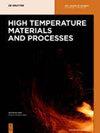高钙烟煤在高炉喷煤粉过程中的熔灰行为及机理
IF 1.5
4区 材料科学
Q4 MATERIALS SCIENCE, MULTIDISCIPLINARY
引用次数: 0
摘要
高钙烟煤具有可燃性方面的优点,但其灰分熔点低,在高炉喷吹过程中容易结渣。为探索高钙烟煤的灰分熔渣形成机理,研究了高钙烟煤燃烧过程中灰分的矿物演化以及灰分组分对熔融过程中液体形成的影响。结果表明:灰分的熔融行为随着形貌的变化而逐渐发生,主要矿物转变是围绕Ca和Si的不同沉积形式进行的。灰在高温下形成液相是其熔融行为的根本原因。CaO含量越高,液相形成的起始温度越高。SiO2含量越高,液相形成的起始温度越低,在一定温度下生成的液相越多。随着Al2O3含量的增加,灰液相还原形成的温度范围扩大到1473 ~ 1673 K。当温度高于1573 K时,Fe2O3能促进灰分液相的形成。本文章由计算机程序翻译,如有差异,请以英文原文为准。
Ash melting behavior and mechanism of high-calcium bituminous coal in the process of blast furnace pulverized coal injection
Abstract High-calcium bituminous coal has the advantages on combustibility, but its ash melting point is low, and it is easy to slag in blast furnace injection process. In order to explore the ash melting slag formation mechanism of high-calcium bituminous coal, the mineral evolution of ash in the combustion process of high-calcium bituminous coal and the influence of ash components on the liquid formation in the melting process were studied. The results showed that the melting behavior of ash gradually occurs with the change in the morphology, and the main mineral transformation is carried out around different deposition forms of Ca and Si. The liquid phase formation of ash at high temperature is the essential reason of its melting behavior. The higher the content of CaO, the higher the starting temperature of the liquid phase formation. The higher the content of SiO2, the lower the starting temperature of the liquid phase formation, and the more the liquid phases generated at a given temperature. Increasing the content of Al2O3 can expand the temperature range of reducing the formation of ash liquid phase to 1,473–1,673 K. When the temperature is above 1,573 K, Fe2O3 can promote ash liquid phase formation.
求助全文
通过发布文献求助,成功后即可免费获取论文全文。
去求助
来源期刊

High Temperature Materials and Processes
工程技术-材料科学:综合
CiteScore
2.50
自引率
0.00%
发文量
42
审稿时长
3.9 months
期刊介绍:
High Temperature Materials and Processes offers an international publication forum for new ideas, insights and results related to high-temperature materials and processes in science and technology. The journal publishes original research papers and short communications addressing topics at the forefront of high-temperature materials research including processing of various materials at high temperatures. Occasionally, reviews of a specific topic are included. The journal also publishes special issues featuring ongoing research programs as well as symposia of high-temperature materials and processes, and other related research activities.
Emphasis is placed on the multi-disciplinary nature of high-temperature materials and processes for various materials in a variety of states. Such a nature of the journal will help readers who wish to become acquainted with related subjects by obtaining information of various aspects of high-temperature materials research. The increasing spread of information on these subjects will also help to shed light on relevant topics of high-temperature materials and processes outside of readers’ own core specialties.
 求助内容:
求助内容: 应助结果提醒方式:
应助结果提醒方式:


